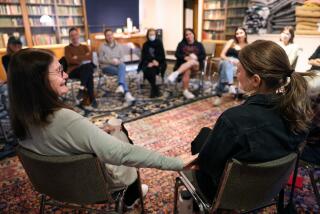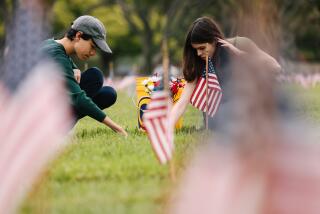Offering an Open Door During Life’s Big Transitions
- Share via
Even under the best of circumstances, preparing for the funeral of a loved one can be overwhelming and wrenching.
The misery is compounded for people without church affiliation because many religious institutions don’t handle funerals for nonmembers or those outside their faith traditions. Imagine having to call around to locate a pastor, priest or rabbi on top of all the arrangements that must be made in short order.
But for some churches, a funeral can become a conduit for nonmembers to join their congregations.
“When people are in a crisis, [even those] who had not needed a religious community need it all of a sudden,” said the Rev. Jonathan Chute, pastor of Rolling Hills United Methodist Church in Rolling Hills Estates. “It’s a powerful time; it’s a meaningful time.”
His church is one of the more notable ones in the Los Angeles area that handle funerals and weddings for nonmembers, including non-Christians. As a result, the church has gained many new members, Chute said. He does an average of 30 nonmember funerals and weddings a year.
Louise Koch, a German teacher at Palos Verdes Peninsula High School in Rolling Hills Estates, joined the church after Chute performed her husband’s funeral two years ago.
She had left the Catholic Church in her youth and had no church affiliation. Even though she didn’t know the pastor, she contacted Chute’s church, where she had once attended a funeral.
Koch said being ministered to by Chute during the difficult time, and observing him prepare the funeral, made a deep impression. She started attending the new-members class within days after the service and later became a member.
Michele McBee, 33, and Brian Lampshire, 36, registered nurses in San Pedro, also joined Chute’s church, but under happier circumstances.
They had wanted a church wedding, but they had no church affiliation. Though they considered themselves “spiritual,” neither had attended church since high school. To complicate matters, she was a Roman Catholic and he a Methodist.
For a year before their April 2000 wedding, they looked for a church. The search took them to Rolling Hills United Methodist, where Chute said he would be delighted to marry them.
“It confirmed that we were in the right place,” she said. “I felt so welcome.”
Five months later, Brian’s grandmother died. Chute led her graveside service.
Soon afterward, Brian’s mother began to attend the church. Two months ago, she became a member.
The Rev. David Koser, a pastor at Lake Avenue Church in Pasadena, makes himself available for nonmembers’ funerals. Those services and weddings, he said, offer milestone opportunities to reach out.
“In weddings, we celebrate the beginning of something; in death, we celebrate the end of something,” he said.
But unlike weddings, which usually involve months of planning, funerals must be organized quickly, Koser noted. He believes that being asked to be with a grieving family and working out details in such an emotionally packed period is a divine appointment.
“It’s a joy to be able to encourage and uplift people,” he said.
Sometimes, funerals provide avenues for pastors to help bring families together when there have been past hurts and conflicts. The message he seeks to impart is: “How short life is! Why not redeem the time by making sense of what we have?”
Because Lake Avenue’s facilities are always booked, he usually does graveside services or funerals at mortuaries.
Mortuaries can also help families without a formal religious affiliation.
Barbara Risher Welch, a funeral director at the Risher Montebello Mortuary, keeps a list of available clergy in all denominations.
“We want to take the burden off the families,” she said. “There are quite a few retired pastors that like to do services.”
Churches, synagogues, Buddhist temples and other places of worship have varied practices on nonmember funerals and weddings. Some handle funerals and weddings only for their congregants or their relatives, while others allow them for nonmembers if they have been attending services. Still others have an open policy on funerals, but not weddings.
For example, at the 1,000-member multiethnic St. Basil’s Catholic Church on Wilshire Boulevard in Los Angeles, no one, including non-Catholics who live within the boundaries of the parish, is turned down for a funeral, said Elba Casanas, office manager at the church. But as at other Catholic churches in the diocese, rules for weddings are more restrictive.
Rabbi Robert Gan, senior rabbi at Temple Isaiah on the Westside, said his synagogue responds to nonmember and mortuary calls as much as possible.
But he cautioned that the needs of his congregation come first and that outside requests are handled by staff rabbis on a case-by-case basis.
Similarly, at the West Los Angeles Buddhist Temple, the Rev. Fumiaki Usuki said he was “fairly open” to doing funerals for outsiders as long as they had a history of Buddhism in the family.
“We have priorities in serving members first, but we don’t turn down others,” he said. “There is quite a bit of dilemma among the younger people. They don’t attend temples, but their parents did and oftentimes they don’t know what to do.”
When it comes to funerals, Calvary Chapel Downey is in a class by itself.
The church offers free funerals for people who attend services there, even if they’re not members, and for participants in the church’s ministry or relatives of regular attendees, said Elizabeth Santillan, office manager there.
Also, through its “Food for Funeral Ministry,” the church provides enough food for a 100-person reception without charge. Volunteers send cards and notes to bereaved families they’ve never met.
“For the family, it blesses them because their members have been ministered to,” said Santillan. “For the church, it is a tool for evangelism.” Some people later start to attend church there, she said.
In Rolling Hills Estates, Chute says that it’s more difficult to perform a funeral service for someone he’s never met, but that it can be done.
“If you listen, people will teach you about their loved one very well,” he said.
One of the more challenging services Chute conducted involved a murder-suicide. At that funeral, he told the gathering that only God was privy to what happened in the last moments of the dead couple’s lives.
“I don’t try to talk to people about their salvation,” he said. “I feel like if I can help them to have an experience of God’s grace in that, I can leave it to God and them to work it out.”
More to Read
Sign up for Essential California
The most important California stories and recommendations in your inbox every morning.
You may occasionally receive promotional content from the Los Angeles Times.













